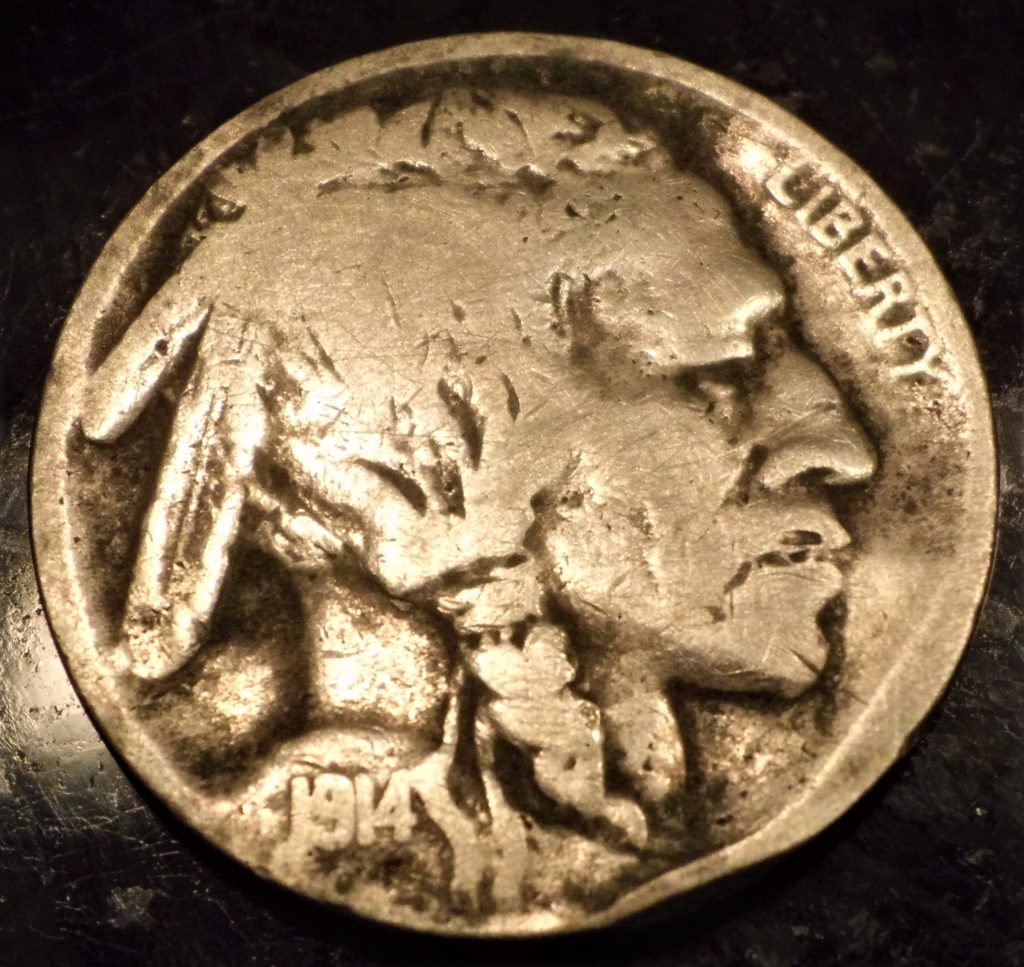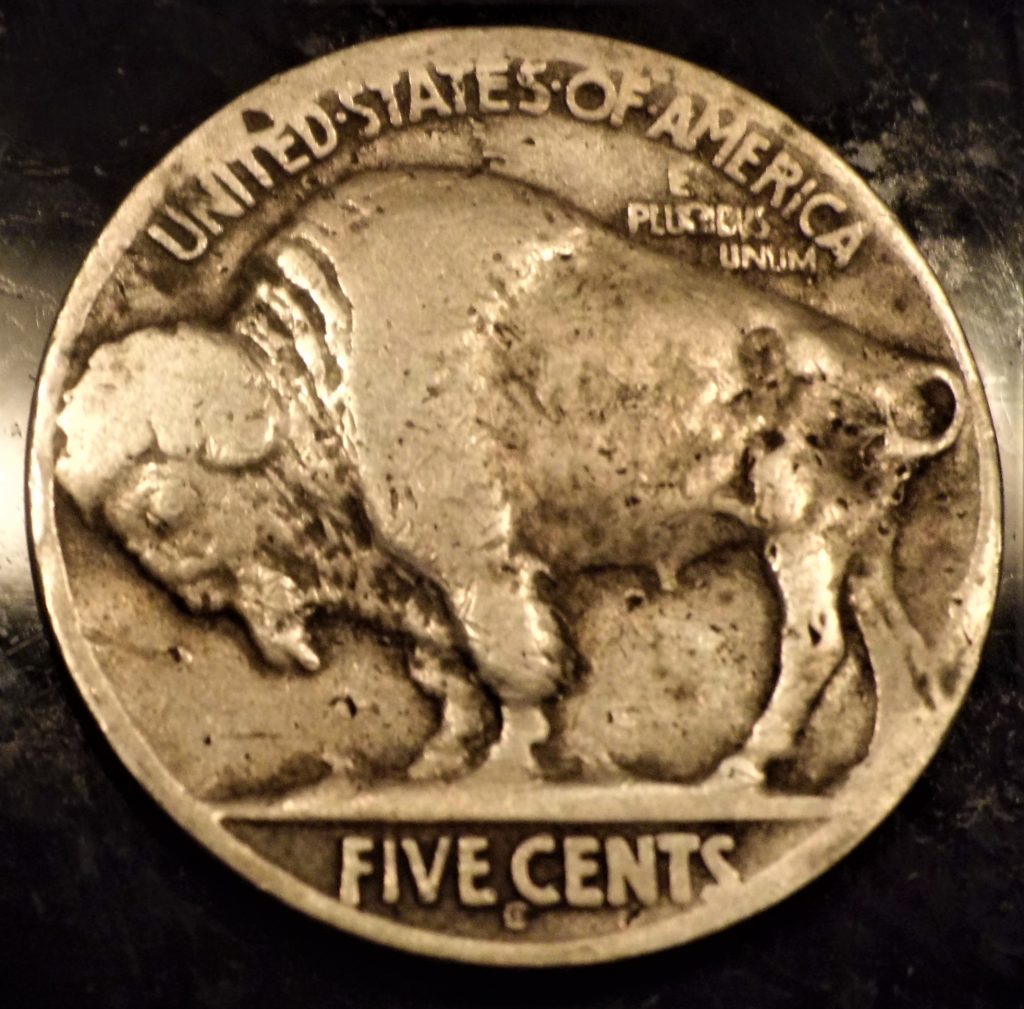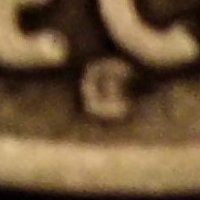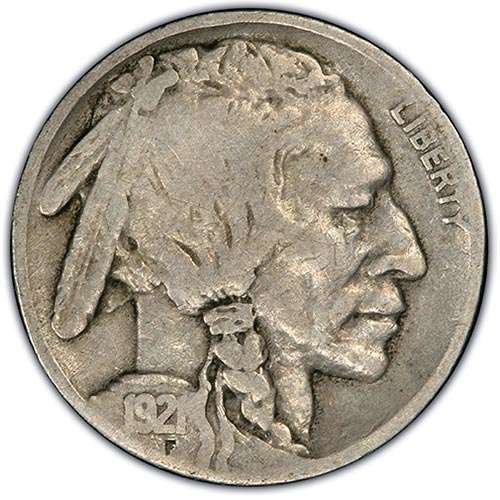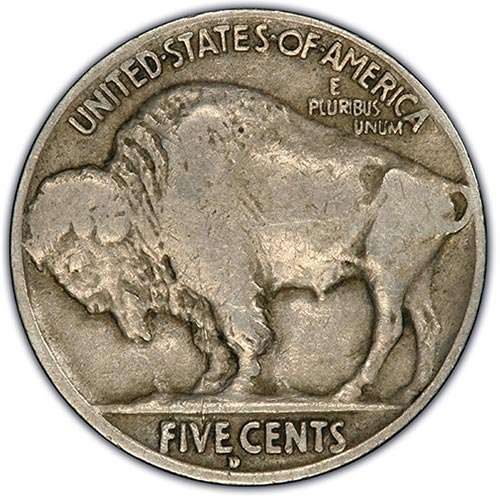Weekly World Numismatic News for November 28, 2021
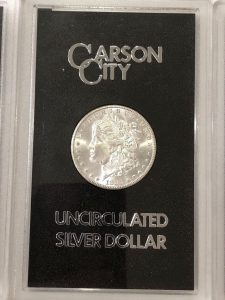 Black Friday, Cyber Monday, and all other names given to special holiday sale days are relics of the past. Times have changed. Black Friday is no longer the day that most retailers begin to show a profit for the year. And with broadband available in many homes, the significance of Cyber Monday has disappeared as quickly as it arrived.
Black Friday, Cyber Monday, and all other names given to special holiday sale days are relics of the past. Times have changed. Black Friday is no longer the day that most retailers begin to show a profit for the year. And with broadband available in many homes, the significance of Cyber Monday has disappeared as quickly as it arrived.
What has not changed is the desire to find gifts at a reasonable price. You can find sales on manufactured goods that do not have a supply chain issue, but you cannot find sales on collectibles.
The collectibles market remains very active. If it is collected, then the prices are higher than expected. I was reminded of this by a friend who has been saving to buy his first Carson City Morgan Dollar. When he thought he had saved enough, the price of the coin he wanted was now 20-percent more expensive.
Although collector coins are going up in value, there are affordable coins that can be stocking stuffers. Over the next week, I will look into what could become a gift for the collector in your life.
And now the news…
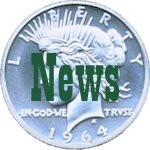 → Read more at smithsonianmag.com
→ Read more at smithsonianmag.com
 → Read more at hcnews.com
→ Read more at hcnews.com
 → Read more at the-sun.com
→ Read more at the-sun.com
Weekly World Numismatic News for January 20, 2019
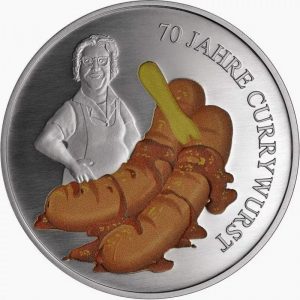
The 2019 coin commemorating currywurst has been called everything from ugly to the wurst (Image courtesy of Staatliche Munze Berlin)
Currywurst is considered the national fast food delicacy of Germany. It is a pork sausage that has been sliced part of the way through, boiled then grilled, and served smothered with ketchup mixed with curry powder. Curry powder is sprinkled on top.
According to a friend who spent time working in Germany, currywurst stands are as ubiquitous in Berlin and many other cities as hot dog stands are in New York. Depending on the stand, they can be served on buns, with sauerkraut, or fries. Since returning to the United States several years ago, he says that his family enjoys the German dish frequently.
Coins have been used to commemorate many things. Commemorating food on coins is nothing new. Coins have been used to commemorate agricultural products like wheat and corn. But aside from the (in)famous bottlecap-shaped coin, I cannot remember when a coin was used to commemorate a prepared food.
Now that the Berlin State Mint has broken this barrier, who’s next? Will the Royal Canadian Mint produce a coin honoring poutine? Or will the Royal Australian Mnt grace a coin with Vegemite? I don’t even want to think about a coin commemorating haggis!
And now the news…
Click image to enlarge MIDDLEBURY, Vt. – A coin collector from Lewiston, Maine, with no prior connection to Middlebury, has donated more than 1,000 ancient coins to the Middlebury College Museum of Art.  → Read more at middlebury.edu
→ Read more at middlebury.edu
A German coin manufacturer has commemorated the country’s love of currywurst with a speciality coin to mark 70 years since the savoury snack was first sold in Berlin. The silver alloy coin, made by Staatliche Munze Berlin, or the Berlin State Mint, features an image of the delicacy’s inventor alongside two giant sausages drowning in curry sauce and pierced with a wooden fork, as is tradition.  → Read more at expressandstar.com
→ Read more at expressandstar.com
A silver medal-thaler, issued by Romanian ruler Constantin Brâncoveanu in 1713, sold for USD 16,000 at a numismatic auction in New York, Profit.ro reported. Brâncoveanu, who was a prince of Wallachia between 1688 and 1714, was deposed from his throne by Sultan Ahmed III.  → Read more at romania-insider.com
→ Read more at romania-insider.com
New Delhi: A new book traces India's numismatic history through 133 rare coins which are illustrative of the country's antiquity, ethos and traditions. In Suvarna Mohur: India's Glorious History Illustrated through Rare Coins by Arun Ramamurthy, Indian history has been divided into 20 epochs.  → Read more at firstpost.com
→ Read more at firstpost.com
The Maine Bureau of Veterans’ Services (MBVS) is pleased to announce the final design selection for the new State of Maine Honorable Service coin and plaque, which will honor all Maine veterans, past and present, regardless of their branch or era of service.  → Read more at boothbayregister.com
→ Read more at boothbayregister.com
SINGAPORE: The number of coins that a buyer can use in a single transaction will be streamlined and standardised to 20 coins per denomination after Parliament passed the Currency (Amendment) Bill on Monday (Jan 14).  → Read more at channelnewsasia.com
→ Read more at channelnewsasia.com
Mobile coin exchange units are hitting the roads to encourage people to swap the loose change they have collected for easier to handle banknotes, so the coins can be recycled. The modified trucks, which are green and clearly marked with the Treasury Department logo, have a window along the side where the coins can be exchanged for notes of equal value.  → Read more at bangkokpost.com
→ Read more at bangkokpost.com
In Berlin, the participants of the most unusual robbery of recent years went on trial. Three young Arab migrants stole a considerable gold coin from the museum using only an ax handle, ropes, stairs, and carts.  → Read more at en.crimerussia.com
→ Read more at en.crimerussia.com
Greater Houston Coin Club members have been on a mission to get kids involved in the hobby.  → Read more at abc13.com
→ Read more at abc13.com
Is this backward “D” an error?
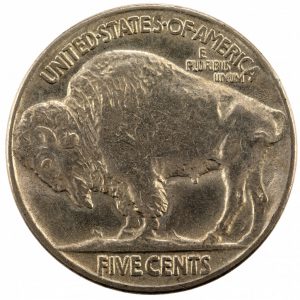 One of the more popular collector series is the Indian Head or Buffalo Nickels. Designed by James Earl Fraser, a student of Augustus Saint-Gaudens, this design was a continuation of President Theodore Roosevelt’s “pet crime” to change the look of the nation’s coinage.
One of the more popular collector series is the Indian Head or Buffalo Nickels. Designed by James Earl Fraser, a student of Augustus Saint-Gaudens, this design was a continuation of President Theodore Roosevelt’s “pet crime” to change the look of the nation’s coinage.
Introduced in 1913, the coin features a right-facing Indian head (now called a Native American head). Although there have been claims by several tribal chiefs that they were the model, Fraser’s notes suggest the image was created using the features of several men.
The reverse features the image of a buffalo, which in reality is a North American bison. The 38 different types of buffaloes live in Africa and feature larger horns similar to a longhorn steer. Most are domesticated and are raised like cattle is in the United States. Bison are largely wild animals native to the western hemisphere. Aside from their shorter horns, they have beards hanging from their chin and heavier coats that allow them to survive in colder climates.
But that has not stopped people from referring to the coin as a Buffalo nickel. It is a design so popular that when it has been used in coinage, the available supply usually sells out.
Like every five-cents coin made since the introduction of the 1883 Liberty Head or “V” nickel, the planchet is made from an alloy of 75-percent copper and 25-percent nickel. Most vending machines will not be able to tell the difference between a Buffalo nickel and a Jefferson nickel.
The coin’s ability to be used in vending machines and how a worn coin could pass the unwatchful eye of a cashier, it is possible to find a Buffalo nickel in change. Although there are very few of these coins remain in circulation, avid change hunters say they can find one every 12-16 months.
This was the case when a reader found what was thought to be a 1914-D Buffalo nickel. Although not a rare or key date, a 1914-D coin could be worth upwards of $70-80 in good (G-4) condition. Finding a Denver mint coin from that year would be better than finding a Philadelphia mint coin since a coin in good (G-4) condition would be worth $16-18.
But this coin was different. Rather than having a “D” mintmark on the reverse, the “D” was backward!
- The found coin, a 1914-D Buffalo Nickel (obverse)
- The reverse of the found 1914-D with an alleged “Inverted D” mintmark
Prior to the U.S. Mint creating dies with mintmarks in Philadelphia, they would send dies to the branch mints without mintmarks. The coiners at the branch mint would use a punch to imprint the mintmark into the die before striking coins. Of course, this manual process was not perfect and there are cases of mispunched, repunched, overpunched, and other such errors.
There have been cases of a mintmark that was punched horizontally into the die. Those mintmarks were repunched correctly. Coins from the San Francisco mint has had errors where the “S” is punched upside down known as an inverted mintmark. This is a fun error to find because noticing this error requires a careful eye and patience along with understanding the shape of the “S” in the font used.
However, there is no reference that mentions a backward punched mintmark.Adding or removing mintmarks is a common method to artificially change the value of a coin. Remove the “S” from a 1921 Walking Liberty half-dollar and watch its value raise by 300-percent. Or practice adding a “D” to a 1914 Buffalo nickel to make a 400-percent profit.
After checking several references and speaking with two dealers, I sat with a box of Buffalo nickels I have to compare the mintmarks to the one on the coin. Additionally, I consulted with the images at PCGS Photograde. After all, it could be a real, undiscovered error.
The first thing I noticed on the image and with the coins I have on hand is that the mintmark on this coin is too defined for the grade. When comparing the coin to the images on Photograde, if the coin was sent in for grading it would probably be assigned a grade of G-6 of VG-8. Because of the worn rims, this coin would not grade higher than VG-8 and could be assigned a G-4.
As I was looking at the coins, those that would grade VG-8 or lower with worn rims also had mintmarks that were almost worn into the rim. In more than a dozen examples from my box, the mintmarks on all of the low-grade coins showed the rims and mintmark worn together.
Another aspect of the mintmark that bothered me was that the “D” seemed smaller than those on the coins I was looking at. For comparison, I pulled out my album with higher grade Buffalo nickels and found that the mintmark was similar in size to those in higher grades.
- According to PCGS Photograde, this 1921 Buffalo Nickel represents a VG8 grade.
- Look at the “D” mintmark on this 1929-D nickel graded F12 as part of PCGS Photograde
Then there is the coloring around the mintmark. Comparing it to the examples in my box, the dirt patterns around the “D” seems off. While the coloring around all of the letters appears to be uneven, there appears to be a consistent line around the “D.” In fact, the coloring at the bottom of the “D” is inconsistent with that of the other letters around it.
If I had the coin in hand, I would be able to examine it closer with a 15x loupe. I would even attempt to pick at it with a toothpick to see if the “D” would fall off. However, given all of the issues with the coin based on the images alone, I am reasonably certain that the “D” was added by someone outside of the U.S. Mint.
Of course, if you have your own theories then please post them as a comment, below.
Weekly World Numismatic News for January 13, 2019
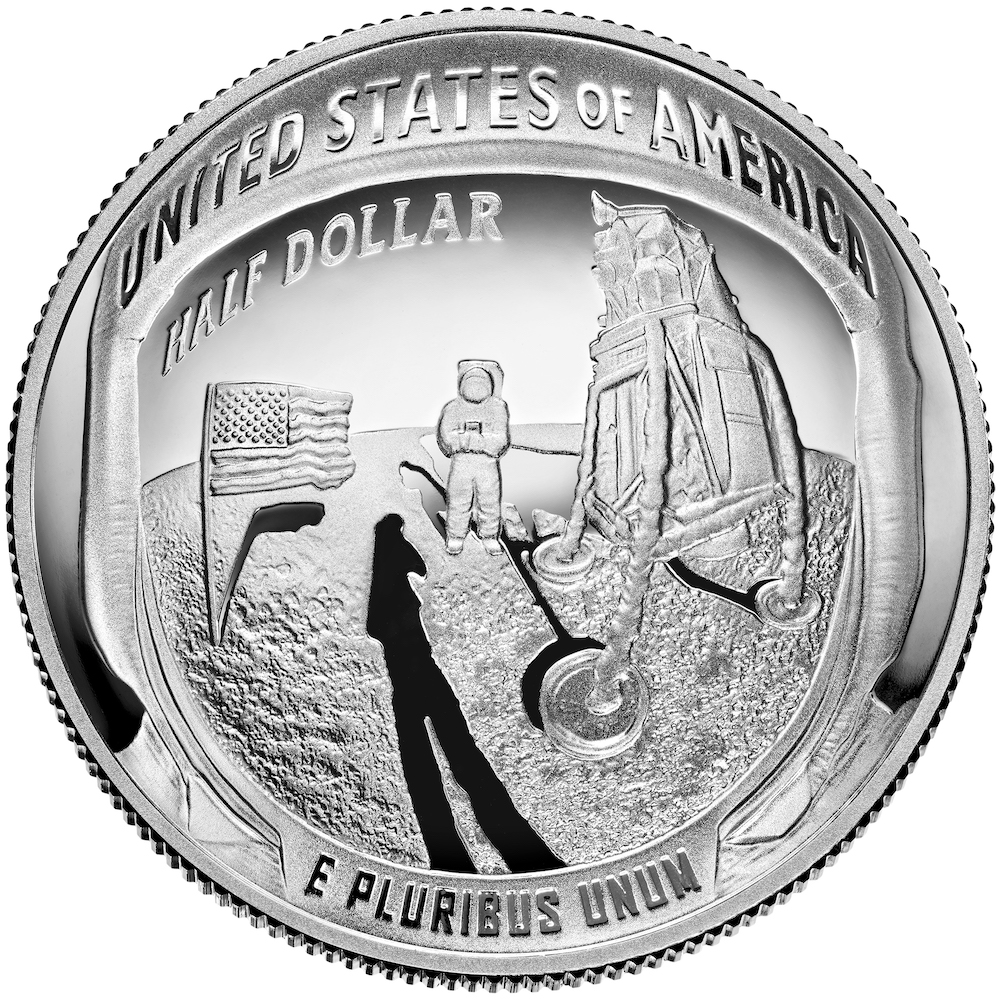 Pairing U.S. coins with a foreign coin for sale has been done in the past by the U.S. Mint. In 2002, the U.S. Mint offered the “Legacies of Freedom” This week, the U.S. Mint announced a collaborative project with the Royal Australian Mint to produce a commemorative coin set in celebration of the 50th Anniversary of the Apollo 11 Moon landing. The set will feature a U.S. Apollo 11 50th Anniversary Half Dollar paired with an Australian 50th Anniversary of the Moon Landing 1 oz. $5 Silver Coin.
Pairing U.S. coins with a foreign coin for sale has been done in the past by the U.S. Mint. In 2002, the U.S. Mint offered the “Legacies of Freedom” This week, the U.S. Mint announced a collaborative project with the Royal Australian Mint to produce a commemorative coin set in celebration of the 50th Anniversary of the Apollo 11 Moon landing. The set will feature a U.S. Apollo 11 50th Anniversary Half Dollar paired with an Australian 50th Anniversary of the Moon Landing 1 oz. $5 Silver Coin.
The announcement noted that the set will be produced and sold by the Royal Australian Mint with marketing help from the U.S. Mint who will put a link on their website.
set. A limited edition of 50,000 sets that included an uncirculated American Silver Eagle $1 coin and a £2 Silver Britannia from the Royal Mint. These sets were created and marketed by the U.S. Mint with a price of $49.88 per set, noting that the spot price of silver was $6.39 per troy ounce.
Prior to that, the U.S. Mint produced the 2000 Leif Ericson Millennium Commemorative Set that included a 2000 Leif Ericson Proof Silver Dollar and a 1000 Kronur proof silver coin produced by the U.S. Mint for Iceland. It was the last coin the U.S. Mint produced for a foreign government. The U.S. Mint sold 86,136 sets at a price of $63 per set.
Since the set will be produced by the Royal Australia Mint, there are questions regarding the opportunities that may be missed by the U.S. Mint to do the same. For example:
- The press release says that it will be a “limited production set” but does not specify how many sets will be produced.
- Other than the legal requirements that the U.S. Mint shall not lose money on a commemorative coin program and that the half-dollar includes a $5 surcharge, what are the financial arrangements between the two government mints?
- Who will handle the fulfillment of orders from the United States? Those who have purchased items from Australia and New Zealand know that the because of shipping and customs restrictions, items can take 6-8 weeks to enter the United States before it can be given to the Postal Service for delivery.
These questions will be addressed to the U.S. Mint as soon as Tuesday. Even though the U.S. Mint continues to operate during the shutdown, offices in Washington, D.C. will be closed on Monday because of 8-12 inches of snow that covers the region.
And now the news…
Coins expected to bring increased security to economies of British territories and dependencies  → Read more at theguardian.com
→ Read more at theguardian.com
A penny that a Massachusetts teenager found in his change from lunch money could be worth as much as $1.65 million (£1.3 million) when it is auctioned off.  → Read more at foxnews.com
→ Read more at foxnews.com
My grandfather was a numismatist. William Evans Mullan II died over the weekend. The coin collection lives on.  → Read more at djournal.com
→ Read more at djournal.com
Don Lutes Jr. kept the 1943 copper penny he stumbled upon in his high school cafeteria seven decades ago in a safe behind a wall in his Massachusetts home.  → Read more at cnn.com
→ Read more at cnn.com
Jim Cramer shares his favorite ways to add gold to a portfolio and encourages investing in the precious metal if you’re nervous about 2019.  → Read more at cnbc.com
→ Read more at cnbc.com
BERLIN — Four young men have gone on trial over the brazen theft of a 100−kilogram Canadian gold coin from a Berlin museum.  → Read more at manitobapost.com
→ Read more at manitobapost.com
Weekly World Numismatic News for January 7, 2019
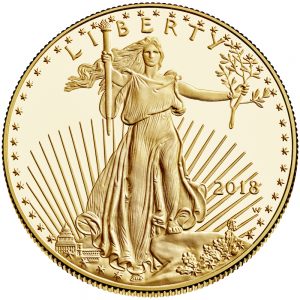 The important news is not being reported in the numismatic press nor by those who are supposed to watch over the industry. The important news is the government shutdown and its potential effects on the economy as a whole.
The important news is not being reported in the numismatic press nor by those who are supposed to watch over the industry. The important news is the government shutdown and its potential effects on the economy as a whole.
Market performance is like a disease. When one part gets infected the rest of the organism will follow. The part the economic organism that is getting infected is the Washington, DC area. Home to 15 companies in the Fortune 500 including government-sponsored Fannie Mae and Freddie Mac, The Washington Post is reporting that 174,800 people have been furloughed in the Washington, DC-area because of the shutdown.
When that many people are not getting paid they are not spending money and the economy gets stagnant. When a region as significant in size becomes stagnant, it is only a matter of time before it spreads to other areas including those where the federal government has the most impact including Alaska, Montana, and New Mexico. Farming states could also feel the impact since the U.S. Department of Agriculture is closed and cannot process subsidy (welfare) checks for farmers hurt by the trade war with China, potentially affecting the price of food.
Since the markets do not like uncertainty, investors tend to seek refuge in precious metals, primarily gold and silver. The problem is that there is so much news that timing the markets has given the market watchers whiplash as the uncertainty seems to force the professional investors (gamblers) to treat the market like they are playing the hokie-pokey: a little bit in, a little bit out, panic a little and shake all about the next news cycle.
The dollar is strong but that is because the Federal Reserve did not raise rates in December. While that averted a panic, the Fed may not be able to hold back if the shutdown continues and puts inflationary pressure on the economy.
With news cycles that could change at the drop of a Tweet, it does not make sense to try to time the market. However, if the price of gold climbing as a result of those in the equity markets looking for a safer haven, you may want to tell your representatives in Congress to work to end this shutdown. Although some would love to see $2,000 per ounce gold prices, it could negatively impact the economy and your ability to collect.
And now the news…
Have you ever wondered what happened to all the old, round £1 coins after they were removed from circulation? We just found out  → Read more at mirror.co.uk
→ Read more at mirror.co.uk
Chain restaurants Sweetgreen and Dig Inn in the US have already stopped accepting cash. Starbucks and UK pubs are also moving towards card and contactless.  → Read more at dailymail.co.uk
→ Read more at dailymail.co.uk
U.S. Mint sales of American Eagle gold and silver coins dropped to their lowest …  → Read more at reuters.com
→ Read more at reuters.com
Editor's Note: Kitco News has officially launched Outlook 2019 – Rush To Safety – the definitive reference for precious metals investors for the new year. We chose this year's theme as financial markets face growing uncertainty.  → Read more at kitco.com
→ Read more at kitco.com
PolicÃa Nacional has issued a warning after a rise in reported cases of members of the public receiving the wrong currency in their change. Instead of being handed back euros, unsuspecting holidaymakers and expats are being short-changed with coins of much lower value compared to the euro.  → Read more at express.co.uk
→ Read more at express.co.uk
KIND-hearted shopkeepers are helping an Inverness youngster with her coin collecting hobby by setting aside specially-minted versions of 50p and £2 coins produced to commemorate historic occasions. A Girl Guides centenary 50p sparked the interest of Cradlehall Primary’s Isla Macdonald, who now has 40 special 50p coins and 30 differently designed £2 coins.  → Read more at inverness-courier.co.uk
→ Read more at inverness-courier.co.uk
December 2018 Numismatic Legislative Review — End of the 115th Congress
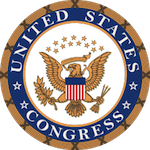 It should come as no surprise to anyone that the 115th Congress left unfinished business. As we start the new year, 25-percent of the executive branch does not have the legal funding to operate. Those with leftover funds operated as long as they could but are now closed pending congressional action.
It should come as no surprise to anyone that the 115th Congress left unfinished business. As we start the new year, 25-percent of the executive branch does not have the legal funding to operate. Those with leftover funds operated as long as they could but are now closed pending congressional action.
As with previous shutdowns, the U.S. Mint and the Bureau of Engraving and Printing are not affected. Both agencies are self-funded from their profits (seigniorage) which is held in their respective Public Enterprise Funds.
The 115th Congress is constitutionally scheduled to end at 12:00 noon on January 3, 2019, when the 116th Congress will begin. Congress will take up the new funding bills as part of the opening session.
When the new Congress gavels into session, any bill pending from the 115th Congress will be removed from the docket. It will be said that these bills will die in committee.
In reviewing December’s legslation update, there was the passage of one bill:
H.R. 1235: Naismith Memorial Basketball Hall of Fame Commemorative Coin Act
The Naismith Memorial Basketball Hall of Fame Commemorative Coin Act was sent to the White House for presidential signature on December 19, 2018. The president has ten days to act on the bill. He can sign the bill, which there is no indication that he has, and it becomes law. He could veto the bill to prevent it from becoming law.
But what if he does not sign the bill? If Congress was still in session then the bill automatically becomes law. If Congress adjourned then the bill does not become law. That is called a pocket veto.
Because of the shutdown, Congress did not adjourn while trying to resolve the issue. There were pro forma sessions, meaning that a representative gaveled in the House and Senate only to adjourn for the day. If the president did not sign or veto the bill, it has become public law. However, since the Government Printing Office (GPO), the official publisher of the U.S. government, is closed because of the shutdown, they cannot publish the results of legislation passed or vetoed. Therefore, we do not know whether this bill is now the law.
Previous administrations would announce bill signings in their regular news streams. This White House has chosen to discontinue that practice leaving us at the mercy of the currently closed GPO.
In December, the Senate passed the National Law Enforcement Museum Commemorative Coin Act by a voice vote. Although the bill was sent to the House for consideration it never left the committee and will die in committee when the 116th Congress is gaveled into session.
S. 2863: National Law Enforcement Museum Commemorative Coin Act
Finally, Rep. Bruce Poliquin (R-ME), whose district includes Kennebunkport, introduced the President George H. W. Bush and Barbara Bush Dollar Coin Act. Essentially, this would have extended the Presidential $1 Coin program to include President George H.W. Bush and First Lady Barbara Bush. This bill, like many others, died in committee.
H.R. 7257: President George H. W. Bush and Barbara Bush Dollar Coin Act
A full review of the 115th Congress will be published shortly after the government reopens and the GPO resumes its publishing operations.
